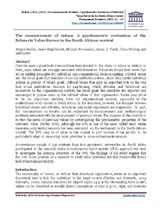The measurement of values: A psychometric evaluation of the Schwartz Value Survey in the South African context
Date
2017Author
Becker, Jurgen
Engelbrecht, Amos
Boonzaaier, Michele
Finch, Jenna D.
Meiring, Deon
Louw, Gert
Metadata
Show full item recordAbstract
Over the years a great deal of research has been devoted to the study of values in relation to work, since values are strongly associated with behaviour. Values are deeply held views that act as guiding principles for individual and organisational decision-making. Cultural values are the broad goals that members of a social institution pursue, since they justify individual actions in pursuit of valued goals. Cultural values thus play an important role in the way that social institutions function by sanctioning which attitudes and behaviour are normative. In the organisational context, the broad goals that members are expected and encouraged to pursue make up the cultural values of that organisation. Values may prove to be an important unifying force for organisational leaders, especially in the multicultural work context in South Africa. In the literature, however, the linkages between individual values and attitudes, behaviour, and social experiences are fragmented. In part, the inconsistency in results can be explained by measurement and methodological problems associated with the measurement of personal values. The purpose of this study is to re-visit the issue of personal values by investigating the psychometric properties of the Schwartz Value Survey (SVS). Although the SVS is one of the most widely used values measures, only limited research has been conducted on the instrument in the South African context. The SVS may be of value in this context in part because it has proven to be particularly adept at measuring value priorities in cross-cultural environments.
Aconvenience sample of 537 students from four prominent universities in South Africa participated in the research study. A confirmatory factor analytic (CFA) approach was used to investigate the internal structure of the SVS. The findings of the study suggest that the SVS holds promise as a measure to study value priorities, but that it may suffer from a lack of discriminant validity.

